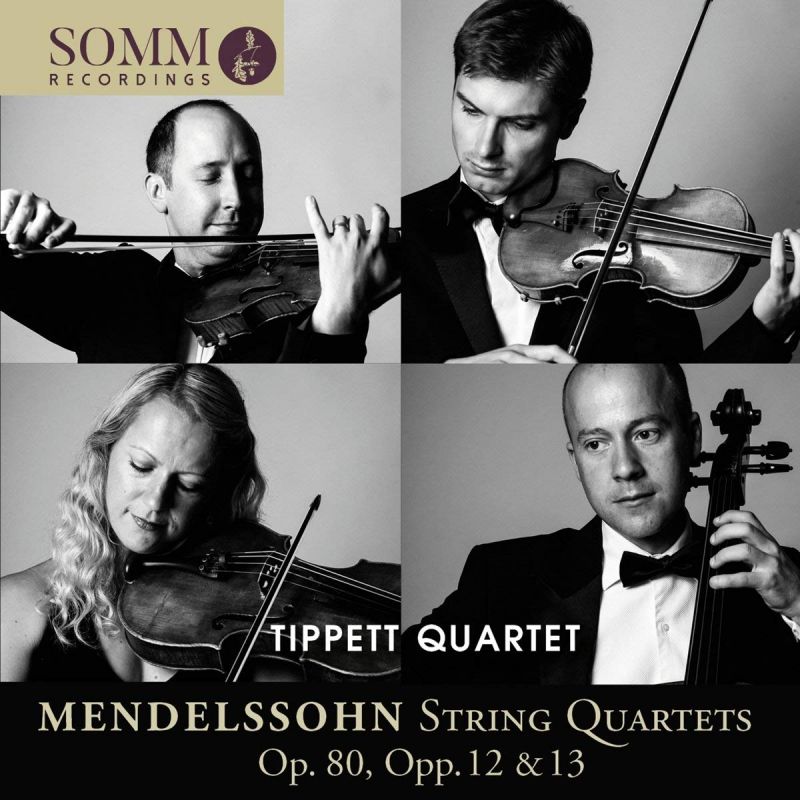MENDELSSOHN String Quartets (Tippett Quartet)
View record and artist detailsRecord and Artist Details
Composer or Director: Felix Mendelssohn
Genre:
Chamber
Label: Céleste Series
Magazine Review Date: 08/2018
Media Format: CD or Download
Media Runtime: 80
Mastering:
DDD
Catalogue Number: SOMMCD0182

Tracks:
| Composition | Artist Credit |
|---|---|
| String Quartet No. 6 |
Felix Mendelssohn, Composer
Felix Mendelssohn, Composer Tippett Quartet |
| String Quartet No. 1 |
Felix Mendelssohn, Composer
Felix Mendelssohn, Composer Tippett Quartet |
| String Quartet No. 2 |
Felix Mendelssohn, Composer
Felix Mendelssohn, Composer Tippett Quartet |
Author: Harriet Smith
They place Op 80 first, drawing us in to Mendelssohn’s fraught world with hushed dynamics and breathless tremolos, creating a strong sense of intimacy. In the second movement they favour a slightly more legato approach than the Elias, playing up the music’s dolorousness. But it’s the Adagio in which the heart of this piece lies; and it’s striking that, though the Tippett, Elias and Ebène are similar in overall timing, the effect is quite different. The Ebène, with generous tone and big individual personalities, transform it into a vocal chorale, songful and intense, while the Elias are intimate yet confiding. The Tippett are more reserved, more Classical in a sense, but perhaps a little too reined in. Their finale is emotionally not as close to the edge as some but it’s impressively played nonetheless and choice will come down to personal taste.
Again, subtlety defines the Tippett’s approach to the earlier quartets. In the opening movement of Op 13 they convey both the mystery of the opening bars and the febrile allegro writing without sounding forced; the Escher by comparison are more given to big gestures, creating a less subtle effect. But in the Adagio non lento I do find the Tippett’s build-up to the climax (four minutes in) just a little foursquare, especially compared to the endlessly flexible Elias. The Tippett’s Intermezzo goes at a nice pace – compared to which the Escher sound a tad businesslike – and the viola interjections are pungently coloured. The following Allegro con moto section has a quiet fizzing quality to it, as if the players are sharing a private joke, and in the finale the Tippett capture the sense of drama without resorting to melodrama and their precision of ensemble in the octave writing is impressive. But I did want just a degree more sense of danger here, something the Ebène deliver in spades.
In the E flat Quartet, the Tippett once again have plenty to say, with an appealing tenderness to the first movement, which is warmly lyrical. The Escher take a more obviously interventionist line with it, which can sound a little forced in places. After a charmingly winsome Canzonetta, the slow movement allows the first violin to soar in the recitative-like writing, something relished on this new recording. And in the skittering finale, the Tippett achieve a fine balance of driving energy without sounding mechanistic. Good recording and fine notes by Michael Quinn.
Discover the world's largest classical music catalogue with Presto Music.

Gramophone Digital Club
- Digital Edition
- Digital Archive
- Reviews Database
- Full website access
From £8.75 / month
Subscribe
Gramophone Full Club
- Print Edition
- Digital Edition
- Digital Archive
- Reviews Database
- Full website access
From £11.00 / month
Subscribe
If you are a library, university or other organisation that would be interested in an institutional subscription to Gramophone please click here for further information.




